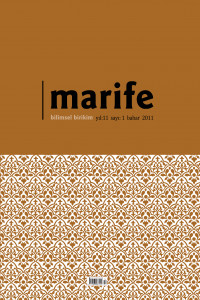Imām Al-Bukhari’s Defense of the Sunna (in the Frame of Kitāb Al-I‘Tisām Bi’l-Kitāb Wa’s-Sunna Section in Al-Jamī Al-Sahīh)
Öz
Bukhārī, who is considered a mujtahid as well as a great muhaddith, stated his own judical opinions in his al-Sahīh while he was determining the subtitles of the sections (bāb/books) in al-Sahīh and participated in the discussions in his term and declared his opinions depending on the basis of the Qur'ān and the Sunnah. In this paper, therefore, we will examine how he defended the Sunnah, ahl al-Hadīth and the integrity of the Qur’ān and the Sunnah in judical discussions. We will focus on why and how Bukhārī refused the opinions of those who claimed that habar al-wāhid does not provide us ilm unless it was transmitted by at least two transmitters or more. Besides, we will study what sort of evidences he used against those groups. He strictly warned us about receiving religious knowledge from Ahl-Kitāb and particularly other cultures and faiths and strongly criticized those who were the first to do so. He accepted the use of ra’y and analogy/qiyās only under certain conditions and criticized whom adopted ra’y, and rejected (qiyās). He defended that the actions of the Prophet Muhammad have an authority on all Muslims to follow, and take the companions as example in that matter. Therefore we have focused instead on “Kitāb al-i‘tisām bi’l-Kitāb wa’s-Sunnah
Anahtar Kelimeler
İmam Buhârî’nin Sünneti Müdafaası -el-Câmiu’s-Sahîh’in Kitâbu‘l-i‘Tisâm bi’l-Kitâb ve’s-Sünne Bölümü Çerçevesinde-
Öz
Büyük bir muhaddis olduğu kadar bir müçtehit olarak da kabul edilen ve fıkhî görüşlerini Sahîh’inde bâb başlıklarını tespit ederken ortaya koyan İmam Buhârî, Kur’ân ve sünneti esas alarak dönemindeki fıkhî tartışmalara katılmış ve bu çerçevede görüşlerini ortaya koymuştur. Bu çalışmada, onun fıkhî tartışmalarda sünneti, ashâb-ı hadisi ve Kur’ân ve sünnet bütünlüğünü nasıl müdafaa ettiği üzerinde durulacaktır. Ayrıca Buhârî’nin haber-i vâhidin ilim ifade etmeyeceğini veya bir haberin ilim ifade etmesi için râvi sayısının birden çok olması gerektiğini ileri sürenlere itiraz ettiği ve bu hususta ne tür deliller kullandığı, diğer kültürlerden ve inançlardan bilhassa Ehl-i kitab'tan ilim almakta dikkatli olunması gerektiği, dinde kötü çığır açanları şiddetle tenkit ettiği, re'y ve kıyas kullanılmasına ancak bazı şartlarla cevaz verirken fâsid kıyası reddettiği, efâl-i resûlün bağlayıcılığını savunduğu, Sahîh’in “Kitâbu’l- İ‘tisâm bi’l-Kitâb ve’sSünne” bölümü çerçevesinde incelenecektir
Anahtar Kelimeler
Ayrıntılar
| Diğer ID | JA72TE63ZZ |
|---|---|
| Yazarlar | |
| Yayımlanma Tarihi | 30 Nisan 2011 |
| Yayımlandığı Sayı | Yıl 2011 Cilt: 11 Sayı: 1 |
Bu eser Creative Commons Alıntı-GayriTicari-Türetilemez 4.0 Uluslararası Lisansı ile lisanslanmıştır.

